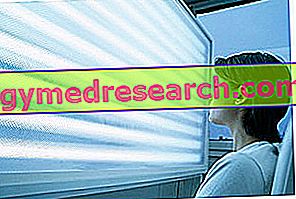Generality
Jet lag is a circadian rhythm disorder that occurs when the body's biological clock loses synchrony with the time and light / dark cycle on which it is regulated. This phenomenon is common when traveling by plane, crossing different time zones.

Symptoms
To learn more: Jet lag symptoms
The disorganization of the internal biological clock (which also regulates the sleep-wake alternation) with respect to the new light / dark periods, determines a series of disorders which, taken together, are called "time zone syndrome".
If the journey leads to the crossing of at least two time zones, the first symptoms of Jet lag usually begin within one or two days of departure. The main symptoms of Jet lag can be:
- daytime asthenia (tiredness and fatigue during the day);
- loss of appetite;
- feeling of general malaise: nausea, headache, muscle soreness;
- sleep disorders, related to an imbalance in the secretion of melatonin: excessive sleepiness, insomnia, difficulty falling asleep;
- reduced physical and mental performance: difficulty concentrating or performing normal activities, reduction or alteration of mood, irritability, nervousness;
- alterations in gastro-intestinal function: problems with digestion, stomach upset, constipation or diarrhea.
It is calculated that, to adapt the circadian rhythm to the new time, approximately 60 or 90 minutes should be recovered every day, with respect to the time zone variation:
- From west to east . The adjustment to the new time zone requires, in days, about two-thirds of the number of time zones crossed (hours of difference between the time zone of departure and that of arrival). Example : changing your time zone by 12 hours to the east requires 9 days of adaptation.
- From east to west . Jet lag leads to disturbances in the duration, in days, of about half the number of time zones crossed. Example : changing your time zone 12 hours to the west takes about 6 days of biological synchronization.
It may take a few days for our biological clock to fully adapt to the new circadian rhythm. The duration of the disturbance can reach a maximum of 7-10 days for journeys to the east that involve crossing 8-12 time zones.
Since the days affected by the Jet lag could affect the total duration of the journey, instead of waiting for the body to become accustomed "naturally", it is possible to intervene in advance to prevent the disorder and prepare for new circadian rhythms, adopting some behavioral measures.
Travel fatigue (travel fatigue) and Jet lag.
The "travel fatigue" is associated with a condition of general fatigue, disorientation and headache, which does not necessarily affect an alteration of circadian rhythms. This condition is determined by a change in routine and time spent in a narrow space, with little possibility of moving during the journey. The fatigue of the journey can be felt even without crossing time zones and the recovery is rather short: a couple of days of rest and a balanced diet are sufficient. Jet lag, on the other hand, causes more persistent symptoms and recovery can last up to a week.
Prevention and Treatment
Preventing the appearance of Jet lag, or at least reducing its intensity, is possible thanks to some simple practical steps:
Before leaving
- Regulate sleep : to get used to the time of destination, while still at home and as far as possible, it is useful to postpone or anticipate the time when you go to sleep by about half an hour a day get up. It is however important not to reduce the hours of night rest, to avoid getting tired at the destination.
- Phototherapy : undergoing regular sessions with lamps that artificially simulate sunlight allows you to absorb the change in time zone .
- Adapt meal times : adjust the clock to the time of the destination country and change the time of meals and sleep, bringing it slightly closer to what is expected to follow during the stay: hunger and sleep are closely connected and tend to influence each other each other.
During the flight
- Help with nutrition : on the day of departure it is advisable to eat light meals. Better to minimize the consumption of tea, coffee and alcohol before and during the flight. Drink plenty of water: the pressurized atmosphere on the plane and dehydration can promote the appearance of some symptoms of Jet lag (feeling of general malaise and fatigue). If once the destination is the problem is insomnia, at dinner you prefer carbohydrates and sugars, which facilitate sleep.
- Rest during travel or : if the journey to be undertaken is long-lasting, it is advisable to start adapting to the new spindle as soon as you board the plane, trying to relax as much as possible during the flight.
Once you arrive at your destination
- If you really can't get through the day, when you have reached your destination, take a short rest of 20-30 minutes, but avoid sleeping for too long. Keep tired for the evening, so you will avoid problems with insomnia and it will be easier to adapt to the new rhythm.
- Avoid alcohol to induce sleep: alcoholic beverages disturb regular rest.
- Do not take excessive doses of caffeinated beverages, even if they are useful to compensate for the drowsiness during the day: they could interfere with the programmed moments of sleep and make sleep difficult, compromising the quality of sleep. Avoid coffee, tea and other exciting drinks in the six hours before night rest.
- Adapt exposure to sunlight : exposure to natural sunlight can help restore circadian rhythms, as it is one of the main factors influencing the body's biological cycles:
- for trips to the west, expose yourself to the late afternoon sunlight;
- for trips to the east, expose yourself to the morning sunlight.
During the day, to shield the light, you can use sunglasses, while at night you can completely close the curtains to darken the room and ensure a good night's sleep.
Jet lag: solutions for treatment
Jet lag does not require a specific therapy. However, if air travel is frequent and the time zone change is perceived as a limiting disorder, it is possible to consult a doctor for the prescription of a drug therapy or a phototherapy treatment.
drugs
As for the pharmacological treatment, some drugs can be prescribed to improve the quality and duration of sleep during the flight and on subsequent nights. These drugs probably will not diminish the diurnal symptoms of Jet lag, but they are useful in cases of subjects particularly sensitive to the change of time zone and that present particular difficulty in reconciling the night's rest.
Drug therapy may include a medical prescription of:
- Non-benzodiazepine drugs, such as zolpidem, eszopiclone and zaleplon.
- Benzodiazepines (very short half-life in low dosages), such as triazolam.
For further information: Drugs for the treatment of Jet Lag »
Phototherapy
Circadian rhythms are influenced by exposure to sunlight. When crossing several meridians, the body must adapt to new times and synchronize its internal biological cycle, to respond correctly to the sleep-wake rhythm. Phototherapy can be useful to make this transition less sudden. The technique uses light for therapeutic purposes and is based on the principle of resetting circadian rhythms through prolonged and repeated exposure to natural or more commonly artificial light sources. During the phototherapy session the subject is placed near a lamp that simulates sunlight for a set time. This device gives off artificial light by simulating natural outdoor lighting, in order to stimulate the biological mediators that act on the brain, with a positive effect on mood and the regulation of circadian rhythms.
Melatonin
Melatonin, taken in a calibrated way, is a remedy that facilitates adaptation to the new time zone, helping the body to get used to the new dark-light rhythm, synchronizing the sleep-wake cycle. The regular intake of melatonin significantly reduces the phenomenon of Jet lag, although some scientific studies have raised doubts about its concrete effectiveness. The remedy is indicated on long journeys with passage through 5 or more time zones and especially on trips to the east. Melatonin should be taken at the next time of night rest for the country of destination, and for the duration of the days of stay.
The doctor will indicate, based on personal needs, quantity and method of employment.
Other Supplements and Natural Remedies
Extracts of hypnotic-sedative plants, such as Valeriana, Passiflora and Camomile, can be useful to "relax the nerves", favoring relaxation and sleep. Phosphatidylserine, a natural phospholipid, is able to lower cortisol levels, the stress hormone whose levels tend to rise in subjects suffering from jet lag.



